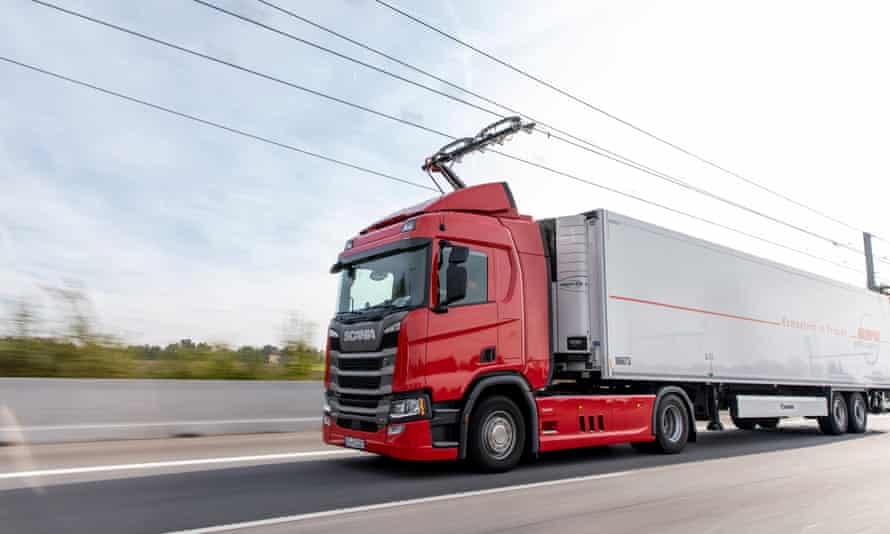UK government backs scheme for motorway cables to power lorries
E-highway study given GBP2m to draw up plans for overhead electric cables on motorway near Scunthorpe

Last modified on Tue 27 Jul 2021 17.00 EDT
The government will fund the design of a scheme to install overhead electric cables to power electric lorries on a motorway near Scunthorpe, as part of a series of studies on how to decarbonise road freight.
The electric road system – or e-highway – study, backed with GBP2m of funding, will draw up plans to install overhead cables on a 20km (12.4 miles) stretch of the M180 near Scunthorpe, in Lincolnshire. If the designs are accepted and building work is funded the trucks could be on the road by 2024.
Road freight is one of the hardest parts of the economy to decarbonise, because no technology exists yet on a large scale that is capable of powering long-haul lorries with zero direct exhaust emissions.
New diesel and petrol lorries will be banned in Britain by 2040 as part of plans to reduce carbon emissions to net zero by 2050. That has given lorry companies little time to develop and commercialise technology that will be crucial to the functioning of the economy. While cars can rely on lithium ion batteries, the weight of a battery required to power a fully laden truck over long distances has prompted trucking companies to look for alternatives.
The e-highway study is one of several options that will be funded, along with a study of hydrogen fuel cell trucks and battery electric lorries, the Department for Transport said on Tuesday.
On the e-highway, lorries fitted with rigs called pantographs – similar to those used by trains and trams – would be able to tap into the electricity supply to power electric motors. Lorries would also have a smaller battery to power them over the first and last legs of the journey off the motorway.
The project is led by Costain, an infrastructure construction company that also operates some UK motorways, using trucks built by Sweden’s Scania and electric technology from Germany’s Siemens that is already in use in smaller-scale trials there, Sweden and the US.
Also involved are academics from the Centre for Sustainable Road Freight, a joint project between Cambridge and Heriot-Watt universities, which previously found that that an electric roads system could put all but the most remote parts of the UK within reach of the trucks by the late 2030s, at a cost of GBP19bn. The white paper, published last year, suggested that the plan would pay for itself within 15 years through charges on electricity.
However, the consortium’s efforts to secure government backing will probably face stiff opposition, not least from other projects. The industry is split between advocates for lithium ion batteries and hydrogen fuel cells, as well as e-highways.
Lorry manufacturer Leyland Trucks, owned by America’s Paccar, will receive funding to trial 20 DAF battery-electric trucks with the NHS and other government bodies.
Another will see London-headquartered Arcola Energy design a trial of hydrogen fuel cell trucks and new refuelling infrastructure in Scotland. Hydrogen fuel cells produce only water as a byproduct, although their green credentials are reliant on producing the gas using renewable energy sources.